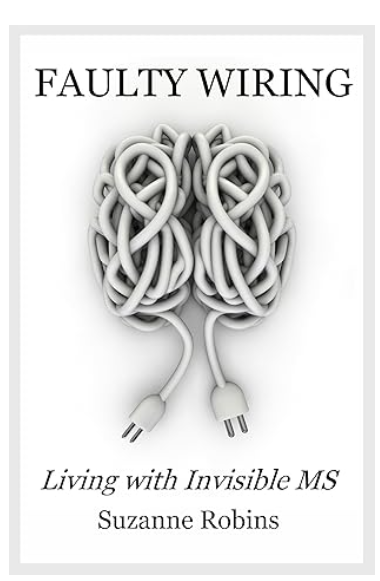An Invisible Illness - MS
If you have an "invisible illness" like MS, you know how difficult it can be to explain it to someone who has no idea what it's like. In the beginning of my husband, Cir's, illness, he was like that. He "looked good" on the outside - strong, handsome, healthy, to anyone he met and even to those who had known him for years, like his family who didn't live with him every day.
And, I have to admit, it was sometimes difficult for me to understand what fatigue or balance issues felt like on an ongoing basis. When he had a full-time job and still helped teach a martial arts class, I felt jaded when we planned extra activities that he would cancel at the very last minute. I would try to make him feel bad about disappointing the children once again when he made promises he knew he couldn't keep.
|
|
He would make a really big deal about the decorative rugs I thought were so necessary to my decor scheme. Yet, when I finally "got it", I find myself in the same predicament, trying to explain the invisible symptoms that go hand in hand with multiple sclerosis to people who have no idea what it means to have MS. |
Other Symptoms
Invisible illnesses can be particularly challenging because, despite the huge impact on your life, they often go unnoticed by others. Besides fatigue and balance problems, below are several other symptoms you can have and still "look great":
Cognitive Problems
- This is often referred to as "brain fog." Cognitive issues can include difficulty concentrating, memory lapses, and slowed processing speed. You may struggle with finding words, following conversations, or completing tasks that were once effortless for you. These symptoms can be frustrating, especially when your family and friends assume that cognitive function don't affect you.
Neuropathy
- Neuropathy refers to nerve damage that can cause burning, tingling, or stabbing pain, often in the hands and feet. It can also lead to numbness, weakness, or sensitivity to touch, making everyday activities uncomfortable or even painful for you. These are symptoms that others can't see and are difficult to understand if not experienced.
Bladder or Bowel Problems
- As a person with an invisible illness, you may experience urinary urgency, incontinence, constipation, or diarrhea. These symptoms can be embarrassing for you as well as disruptive to your social life. It can often lead to anxiety about leaving home or participating in outside activities. This can lead your friends and family to eventually stop inviting you to gatherings.
Tingling
- A persistent sensation of pins and needles or electric shocks running through the body can be a sign of nerve dysfunction. This symptom may come and go or remain constant, affecting mobility and comfort. This is not particularly easy to explain to others either.
Numbness
- Loss of sensation in certain areas of your body can make it difficult to detect temperature changes, pain, or pressure. Numbness can affect your fine motor skills, making tasks like buttoning a shirt or holding objects more challenging.
Sexual Problems
- Invisible illnesses can impact your sexual health in various ways, including reduced libido, difficulty achieving arousal, or pain during intimacy. These issues can stem from nerve damage, hormonal imbalances, or even emotional distress.
Acute and Chronic Pain
- Pain can range from sharp, sudden episodes to persistent, aching discomfort that lasts for months or years. Chronic pain can be exhausting and debilitating, affecting mood, sleep, and overall quality of life. And it's another symptom that can cause you to withdraw from social settings.
Dizziness and Vertigo
- Feeling lightheaded, off-balance, or experiencing spinning sensations can make walking or standing difficult. These symptoms may also be linked to neurological conditions like your MS, inner ear disorders, or medication side effects.
Sleep Disturbances
- As a person with an invisible illness, you may struggle with insomnia, restless sleep, or excessive fatigue despite sleeping for long hours. Poor sleep can worsen your other symptoms, leading to a cycle of exhaustion and discomfort.
Helping Others Understand
Since these symptoms are not always visible, it can be difficult for your family and friends to grasp the severity they can make in your life. Open communication, sharing of educational resources, and explaining how symptoms affect your daily life can help bridge the gap.
You can also encourage your loved ones to be patient with you as well as more supportive. This can make a significant difference in making it possible to manage an invisible illness like MS. Having an understanding support group around you will make it much less frustrating to deal with the everyday challenges of multiple sclerosis; especially the invisible ones.
Ways to Help Them Understand
Tell them. Talk to them. Show them. Give them examples in a way that they can relate to. One way that Cir helped us to understand his balance problem was like this:
- Have you ever walked on a mattress when you were little? It was funny when you almost fell over, and when you did lose your balance and fell, bouncing on the mattress, it was even funnier.
Not so much when you have MS. If you feel that way all the time - like every step feels as though you are walking on a mattress, then, no, it's not so funny. Nor is it safe.
Fatigue was a little more difficult for us to understand and took more than an explanation.
- When I developed congestive heart failure, and took medication that purposely induced fatigue, I realized how debilitating it can be. I wasn't able to do anything for weeks. Although I had come to terms with Cir's fatigue long before that, I totally got it after experiencing it with my illness. And maybe not totally because I don't have it anymore. But it was very clear that fatigue is no laughing matter for someone who has to live with it almost every single day.
Living with an Invisible Illness
Having an invisible illness can be very depressing and cause you to remove yourself from situations where you need to always explain what's happening. Or it can keep you from living the life that you want. If you turn down or cancel invitations to events, and refuse to make plans because you don't know if you'll be able to keep them, this can make depression worse.
But how do you make it work? Over time, and with the support of family and friends, Cir has learned to do just that. He still occasionally has to cancel, but he doesn't beat himself up about it and I've learned to take it in stride. There will be other events, and when he has good days, we take full advantage of them.
Coping Strategies for Invisible Illness
How do you cope with an invisible illness? What are some coping strategies that can help you come to terms with living with MS in spite of what others do?
- Prioritize Self-Care – Listen to your body and rest when needed. Managing symptoms effectively can help prevent burnout.
- Set Boundaries – Learn to say no to activities that may worsen your symptoms. Protecting your energy is essential.
- Use Assistive Tools – Mobility aids, ergonomic tools, and apps for symptom tracking can help you manage daily challenges.
- Practice Stress Management – Meditation, deep breathing, and mindfulness can help you reduce anxiety and improve your overall well-being.
- Seek Support – Connecting with others who have similar experiences through online forums or support groups can provide emotional relief, so you don't feel alone.
- Educate Yourself – When you understand your condition, it empowers you to advocate for your needs and make informed decisions when dealing with others.
To Sum it all up
You can help others understand your invisible illness by doing the following:
- Communicate Openly – Share your experiences with family and friends. Explain how symptoms affect your daily life.
- Use Analogies – Comparing symptoms to something relatable (e.g., fatigue feeling like carrying a heavy backpack all day) can help others grasp the impact.
- Provide Resources – Share articles, videos, or medical explanations to help educate your loved ones.
- Encourage Empathy – Ask others to be patient and supportive rather than dismissive.
- Advocate for Awareness – Raising awareness about invisible illnesses can encourage understanding in workplaces, schools, and social circles; not just for you, but for others who come after you.
We - Cir and I - don't always try to make people understand when we first meet them. Why? Because it doesn't really matter that they do. What matters is that Cir is able to live his best life without the stress of dealing with people who don't matter in his life. And those that do matter, they'll eventually get it and/or get over it. It may sound harsh, but he doesn't need the stress. He does what he can, when he can and we're happy with that.
I just ran across the book above that deals specifically with this issue. It may help answer your questions about invisible MS even more than we have. The blogger, Suzanne Robins used to have a blog, however, I can no longer find it.
Dear Friends,
"Life in Spite of MS is a participant in the Amazon Services LLC Associates Program, an affiliate advertising program designed to provide a means for sites to earn advertising fees by advertising and linking to Amazon.com. We're also part of the Ebay Partner Network, another affiliate program."
We'd also like you to know it doesn't cost one cent more when you click through the links here on our blog. Not one single penny. And we will make a little extra cash when you do click through. We'll be ever so appreciative. You also have our word that we'll only link to things that we would use ourselves, (or wish we could have or use).
Sincerely,
Cir & Akrista
You are reading original content written by Akrista or Cir L'Bert of Life in Spite of MS. If you enjoyed reading this blog, please consider following us on Facebook, Twitter, Pinterest, and Instagram. See you there!
Privacy Policy ~ Advertising Policy ~ Disclaimer ~ Contact Us ~ About Us






New! Comments
Have your say about what you just read! Leave me a comment in the box below.